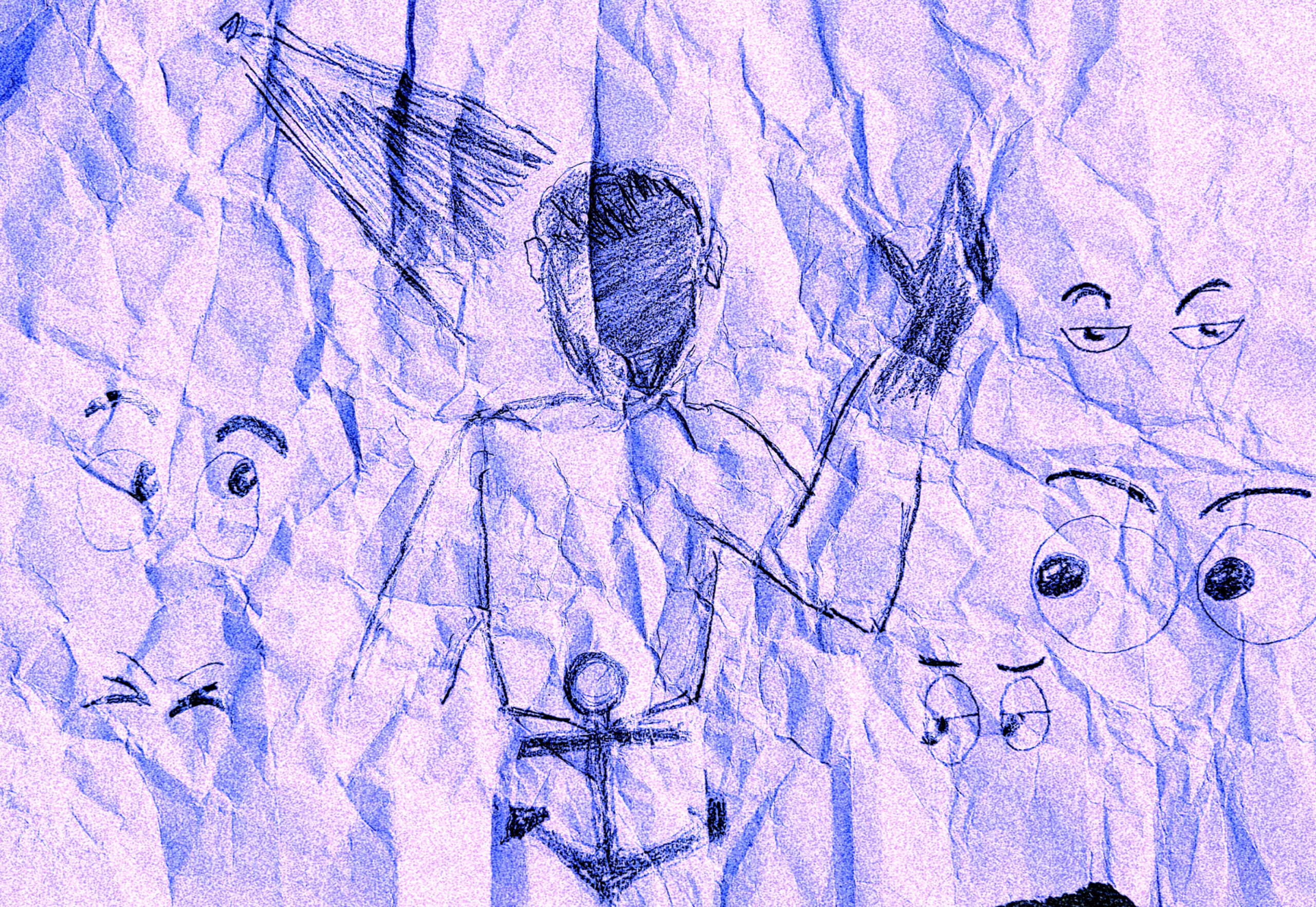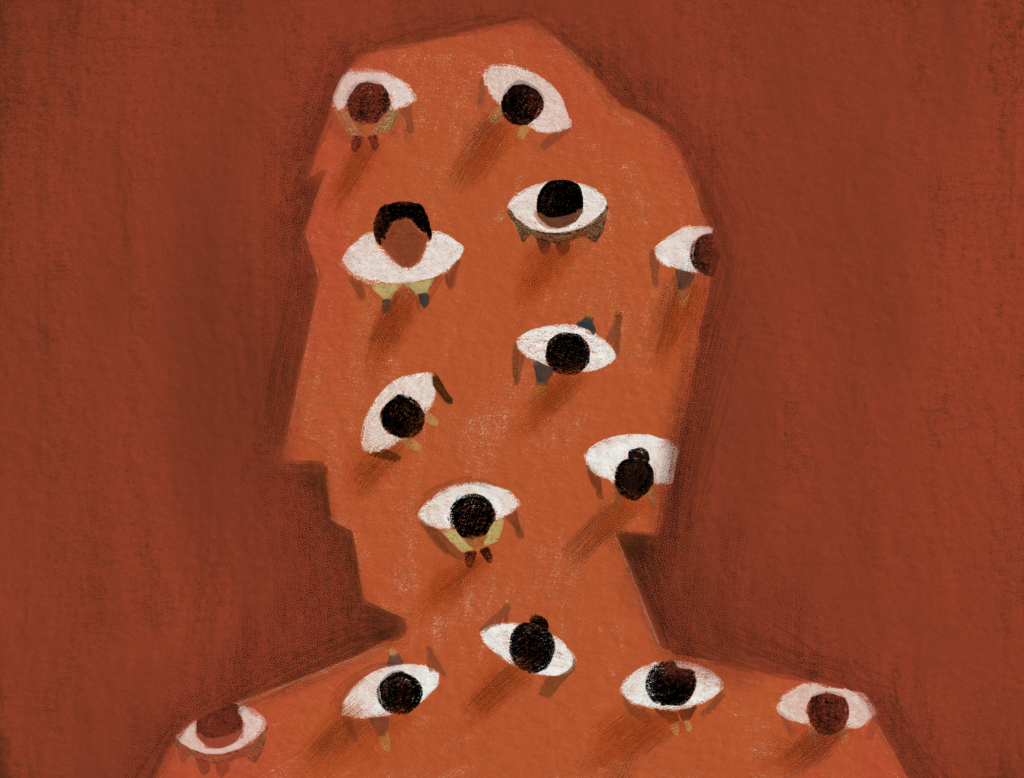The following conversations are my attempt to explore the less spoken-about, low points in the journey of being a leader and a person seen as an authority figure. I’ve not written these conversations verbatim. There are five conversations in all, with no fixed structure. All conversations began with a basic assumption on my part – when people see you as an authority figure or you are in a leadership position, you cannot please everyone.
There will always be some people who are dissatisfied or disappointed. Often, we overhear something being said about us, stemming from this dissatisfaction. Or we know of what’s being said indirectly through other team members. Either way, the feeling of being misunderstood or our well-intentioned actions being interpreted as malicious, is not pleasant to come across. This is what I said to the five people in these conversations and asked if they recall any such experiences or the emotions evoked in them during such moments. Here we go.

Conversation – 1
Something I find quite annoying is that so many times when I call people in for a casual conversation, they respond in a way like I might put them at gunpoint. In their own heads, they try giving an explanation for something before I could possibly ask them. It’s their guilty conscience speaking. But I feel like they are unable to see me beyond that particular role. Another thing is that I don’t seem approachable. So much of what I say is with a straight face and the other person interprets it as if I’m angry or disappointed.
Me being in this position for quite a long time has also made me care less about being liked. Earlier, I would be extremely careful about what I said but now having a difficult conversation or giving critical feedback is easier.
But how can one not care about being liked?
Because an aspect is, how secure do you feel in other roles? I feel seen and secure. Even liked and cared for in other roles. So in this one area where people see me as an authority figure and not like me too much, it doesn’t really matter. This has also changed how I view my own relationship with authority. I am more comfortable now and the conversations flow smoothly, I can empathize better with them.
Do you feel authority figures are dehumanized?
I think villainizing is easy because it’s easy to put someone in a box and label them for something they have done. Also, for some decisions they took. But I think the person villainizing should also carry the responsibility of coming up with an alternative.
Is it isolating to be in this position?
It is isolating. You need to constantly motivate yourself, believe what you are doing is important enough for you to tolerate the low points. Also, isolation is not so much a worry as long as you ask for help and have people to spend time with. Sometimes, seeing the person at the top might look like a lonely position from down here. But I think they are also anchored somewhere.
When do you think people begin seeing the authority figure with so much distance?
In my situation I think the age gap increases the power distance. It’s easier to resonate with people closer to my age group of course. But then you adapt. You find ways to work around and with the changes.
One amusing pattern that I’m thinking of in this context is, even now sometimes when I meet people (who I have been an authority figure for at some point), they assume I will pay. Imagine! Years after not playing that role in their lives …
Conversation – 2
One incident I remember had particularly affected me was when in a situation where a decision needed to be taken regarding a project along with other team members. There was no clarity about who would take the decision and that delayed the process. Now since taking initiative is a large chunk of my personality, I stepped up and took a call.
After this, I indirectly got to know how another team member made a comment. It was along the lines of, “of course it will boil down to what she decides since she is the final authority in deciding who will do what”. Which wasn’t true for that situation where other authority figures were a part of the team. They knew a decision had to be made. When there’s a lot of uncertainty, it’s good to be seen as that final authority. But not in a team of peers over subordinates.
Does it get isolating to be in this position?
See, I think if you look for companionship solely in your team, of course you will feel isolated because of the power distance. Then there are also these other groups where I am seeking a friend. Not too many people in my workplace will talk to me only for friendship. Which is why I look for friendship in other peer groups.
How is your relation with authority?
I’m very comfortable with authority. I have a lot of ease working with them. Also because I am able to adapt very quickly with different leadership styles. I have never had a bad boss. Not because they haven’t been a bad boss but because I am comfortable adapting. It’s my communication. I structure my own plans while flourishing in the presence of good authority.
Where does this ease come from?
It comes from the first few bosses. They created a particular impression of authority. I think another factor is while growing up, I was around elderly people. Even in school, I was good at academics and so had a good relation with teachers. So since I’ve never had to struggle with authority in family or school context, the transition was natural.
Do you remember any incident where you felt bad on directly/indirectly hearing something people were saying about you? (Coming from people who felt disappointed or disapproved of a decision you made)
No, not really because when it doesn’t surprise me, I don’t feel bad because I already expect it. You only feel bad if you know the impression is not correct. But when you already expect that impression, you’ve already accepted the response in your head.
A feedback i have often received is that I prioritize personal ethical gain over institutional gain. This makes me come across as not very loyal to the institution. At forum where i was expected to ‘defend’ the institution’s stance, for example, i was found reflecting and focussing more on right and wrong.
How does this villainizing make you feel?
If you work with younger people, which is my role, they have fewer life experience. Also, they have fear and insecurity around their own performance – so they sometimes villainize. I think, the key is to find people who don’t do that. This is what keeps you going.
Do you feel liked and included by your own team?
I have no vested interest in being liked. I don’t have that expectation. But I know people like me nonetheless. And some distance is necessary, isn’t it? I don’t think people would even want me as a leader if I wouldn’t know more than them. It’s like the allegory of the cave, you cannot be a caveman. To rule the cave, you have to be an outsider.

Image By Daraab Abbasi (India Fellow of the 2022 Cohort, the author’s cofellow) and Oshin Chawla for representation purpose
Conversation – 3
50% या उससे ज़्यादा लोग कोई काम करने के लिए करते हैं। टीम में जब किसी काम को लेकर दिक्कत है, मैं समझना चाहता हूँ की उसे इस नज़र से क्यों देखा जा रहा हैं, ना-खुश होने की वजह क्या है। अभी हाल ही का एक उदहारण है की हमने एक नई स्ट्रेटेजी बनाई काम को अलग ढंग से करने की, फोकस्ड एप्रोच रखने की।अब हुआ क्या – कुछ लोग चुपके से बिना बताए पहले तरीके से ही काम कर रहे थे। इस मामले में समाधान बहुत बात-चीत करने के बाद हुआ। काम के नतीजों को एक साथ रखा और टीम को सोचने बोला क्यों कुछ नतीजे बहतर है और वह खुद अंत में महसूस करे नए स्ट्रेटेजी का प्रभाव, ना की हम उनपे यह ज़बरदस्ती लागू करे।
दूसरा उदाहरण है, मुझे और लोगो से फीडबैक मिला था की आपको विलेन की तरह देखा जाता है। मुझे एक समय के लिए बुरा लगा की ऐसा क्या बोला मैंने? पर एक समय बाद मैंने निकाल दिया दिमाग से। मैं ऐसे स्थिति में सोचता हूँ की इंसान मुझे 100 में से शायद 10% ही जनता हो तो उनके साथ और काम करने की ज़रूरत है जब तक उनको खुद यह लगे की उस स्थिति में मैंने ऐसा कुछ गलत भाव से नहीं बोला था। शासन फिर अनुशासन बहुत ज़रूरी होती है। लीडर होने के नाते कुछ गड़बड़ हो तो मैं दोष लेने के लिए तैयार हूँ, यह भाड़ मैंने ली है।
आपके लिए आइडियल लीडर कौन होगा?
मुझे 2 लोग ध्यान आ रहे हैं। एक से मैंने सीखा है की टीम हमेशा अपनी हैं, टीम नहीं तो अधूरे है। दूसरे से मैंने सीखा है सब एंगल को देखना किसी भी परिस्थिति में। और इन दोनों में यह पसंद है – व्यक्ति को व्यक्तित्व के आधार पे ना ताकें। एक और चीज़ यह सीखी की कभी किसी कारण से अगर किसी टीम के सदस्य या कर्मचारी को हटाने की बात आती हैं तो उसमें कभी इस कारण से झिझक न हो की अगर यह हट जाएगा तो काम तो पूरा ही रुक जाएगा। क्यूकी नहीं, सब रिप्लेस हो सकते हैं, एक दुसरे की स्थान ले सकते हैं। काम होगा थोड़े टाइम सफर। लेकिन अगर ज़रूरी काम से वह आदमी छोड़ना चाहे या उनको हटाना ज़रूरी था तो यह तो छोटी सी कीमत है।
क्या आपको इस दौरान अकेला महसूस हुआ है?
हाँ कुछ स्थितियों में होता है यह महसूस। जैसे कुछ बात मैं मैनेजमेंट से करना चाहता हूँ टीम के हित में लेकिन मैं टीम को पहले नहीं बताना चाहता ताकी उनमें कोई उम्मीद अगर पैदा हो गई और मैनेजमेंट ने मना कर दिया तो मैं एक ऐसा माहौल बना रहा हूँगा जहाँ टीम मैनेजमेंट के प्रति बहुत ना- खुश होंगे। तो अगर यह अवॉयड किया जा सक्ता है तो क्यों नहीं? फिर ऐसी स्थितियां भी होती हैं जब मैनेजमेंट से कुछ अप्रूवल चाहिए जिससे पहले मैं टीम से पूछता हूँ। मेरी हर बात चीत में कोशिश रहती है की टीम से चर्चा होके ही निर्णय लिए जाए। कभी मेरे दिमाग में भी आईडिया आये तोह मैं पहले टीम से चर्चा करता हूँ उसके बाद ही आगे ले जाता हूँ।
मैनेजमेंट और लीडर में क्या फ़र्क़ है?
ऐसे तो मैनेजमेंट का हिस्सा मैं भी हूँ लेकिन टीम लीडर होने के नाते हमें लोगो की कुछ पर्सनल स्थितियां भी पता रहती है। मैनेजमेंट का काम करने का ढंग काफी स्पष्ट होता है। जैसे आपको यह 4 काम करने हैं और बस। शायद मैनेजमेंट को ऐसा होना भी ज़रूरी हैं क्यूकी सब तो सारे रोल्स नहीं खेल सकते। लेकिन टीम लीडर को फिर बीच का रास्ता निकालना पड़ता हैं अक्सर। सोचना पड़ता है कहा सपोर्ट की ज़रूरत हैं, हर कार्यकर्ता का देखना पड़ता हैं।
एक चीज़ जो मुझे नहीं पसंद आती हैं जब मैनेजमेंट सीधे इंटरफेर करें। वह इसलिए क्यूकी उसके बाद की गड़बड़ या रिपोर्टिंग की ज़िम्मेदारी मेरी है। तब मुझे लगता है मैं इस पोजीशन में क्यों हूँ और क्या कर रहा हूँ? मुझे पता तो होना चाहिए। मेरा उस पोस्ट में होने का क्या तात्पर्य है? मुझे पता तो हो की बदल क्या रहे हैं नहीं तो सारा काम बिखर जाता हैं। फिर कोई स्ट्रक्चर नहीं रहता और मेरे हिसाब से स्ट्रक्चर और आर्डर होने के लिए थोड़ा हायरार्की ज़रूरी तो है।
Conversation – 4
आप लीडरशिप प्रोसेस में जैसे-जैसे आगे बढ़ते है, वैसे यह (असंतुष्ट लोग की) संख्या बढ़ती जाती है। 4-5 लोग में आप फिर भी आमने-सामने बात करते हैं पर आगे बढ़ते हुए, ऐसा नहीं हो सकता। एक उदाहरण है …
टीम में महिला साथी को प्रसव हुआ था और शाम को थोड़ा जल्दी जाना था। पुरुष साथी ने बोला, “वह मशीन नहीं हैं तो हम भी नहीं हैं”। उसके वजह से और साथी ने अपनी सहमति जताई। जिस तरह से उस एक पुरुष साथी ने अपना विरोध जताया, उसने कई और चीज़ें उसमें जोड़ दिए और अंत में छोड़ दी संस्था। इससे समझ आया की कितना असंतोष था। मुझे उस वक्त ऐसा लगा की हम हमेशा कहते हैं की हमारी मूल्य हैं संस्था में सबको साथ लेके चलते हैं। तबेला वाली मूल्य हैं। हमारे काम में उतार-चढ़ाव भी होते हैं वह भी ध्यान रखना हैं। हमेशा यह तो नहीं कह सकते की यह सब पर फ्लैट लागू होगा।
कई मौको पर आपको स्टैंड लेना पड़ता है। हाल – फिलहाल का उदाहरण है, कुछ महिलाओ ने एक बात रखी, मेल भेजी। उससे पहले कुछ और पुरुष आए और बोले की महिलाएं डर का माहौल बना रहे हैं। इस वजह से काफी गॉसिप शुरू हो गई और कई सारी साथी ने मुझसे दूरी भी बना ली। महिला साथियो से भी दूरी बना ली जिनकी प्रत्यक्ष भागीदारी भी नहीं थी। गॉसिप से असहमति पता चलती हैं लीडर के प्रति। लेकिन, अप्रत्यक्ष रूप से। मेरे सामने नहीं पर पीछे से।
यह झिझक क्यों हैं लीडर से सीधे सीधे बात रखने में, असहमति जताने में?
अक्सर लीडर रोल में जो होता है वह होता हैं सत्तावादी, अधिकारवादी। हायरार्की में तो ऐसा है न की असहमत हो फिर भी सहमति जताओ। जैसे बड़ो को सीधा ‘ना’ कह दिए मतलब आप बद्तमीज़ हो गए। तो साथिया बहुत तरह से ऐसे डायरेक्ट असहमति नहीं जताते। और वह माहौल सहज बनाना आसान भी नहीं है। आप भले कितना भी बोले, आप हर चीज़ पर चर्चा तो नहीं करते। बहुत सारे चीज़ो में डायरेक्ट एक्शन लेना पड़ता हैं। लेकिन बाद में जब हम बात करते हैं किसी टीम के साथी से तो लगता है, हाँ मुझे बात कर लेनी चाहिए थी। हम स्पेस कितना छोड़ रहे है, बना रहे है इंसान के लिए, उसके हिसाब से ही वह जता पाएंगे या नहीं जताएंगे।
मैनेजर और लीडर के बीच का द्वन्द – वही दिक्कत है। कोविड के दौरान जैसे मुझे लग रहा था की यह करना चाहिए लेकिन टीम के बहुत लोगो को लग रहा था की हमारी जान दाव पे है तो नहीं करना चाहिए। हमारी मैनेजमेंट का कहना था की नहीं सबको आना ही चाहिए। मैं भी जब फॉलो-वर के पोजीशन में हूँ तो यही बात है की किस से मैं ज़्यादा सहज महसूस करता हूँ …
क्या आपको इस दौरान अकेला महसूस हुआ है?
मेरे अनुभव में ऐसा नहीं रहा है की मैं बहुत अकेला रहा हूँ पर मैं बहुत साथियो को जानता हूँ जिनका बड़ा टीम है पर वह काफी अकेला महसूस करते हैं। मेरी नज़र में यह रहता है की आप जुड़के किसके साथ काम कर रहे हो। आप काम के साथ जुड़ के काम करेंगे तो अकेला महसूस होगा लेकिन लोगो के साथ जुड़ के काम करोगे तो ऐसा बिलकुल नहीं लगेगा।
आपके लिए आइडियल लीडर कौन होगा?
मेरे लिए आइडियल लीडर की तालाश जारी है। सीधा और सपाट होना चाहिए। यह करना है मतलब यह करना है। उससे जो कल्टी मार जाए, ठीक नहीं। मैं लीडर में देखता हूँ की अच्छी स्तिथि हो या खराब उसे रहना चाहिए।अगर साथी को मुकड़ना है तो ठीक पर लीडर को नहीं मुकड़ना चाहिए।
अच्छी चीज़ो को जिस भाव से ले रहे हो, बुरे को भी उसी से लो। दूसरा चीज़ जो मैं देखता हूँ वह है, विश्वास।इतना कॉन्फिडेंसहो साथियो में और अपने में भी विश्वास दिखाए। हम मिलकर कर सकते हैं। तीसरा, अंदर हो आप वैसे ही बहार हो। चौथा, ज़रूरत के वक्त साथ हो। मैं पिट गया तब तुम भी पिटोगे पर पहले मैं पिटने के लिए हाज़िर हूँ और ज़िम्मेदार भी!
बस अंत में यही सोच हो की दुनिया बदले ना बदले, कोशिश तो करनी है।वो दुष्यंतजी कहते हैना, “कौन कहता है आसमान में सुराख नहीं हो सकता, एक पत्थर तो तबियत से उछालो यारों!”
Conversation – 5
No two humans are the same. But there’s one human who will compromise and try to be similar to the other one. So that compromise situation is when one feels forced. Take China for example, the citizens there are forced. They don’t necessarily feel their leaders are taking the right decision. So many people are not liking so many decisions but they have to keep quiet. Another thing is that the government there probably feels they are taking decisions for their country. And how will the country benefit? A set rule is made and people must follow. My interpretation of how they see it is, external factors try disturbing you so to curb these external disturbances, you make curbs inside for your own people. It’s true, you cannot satisfy 100% people. But at least 80% should benefit.
It’s also about reaching a certain level. For example, today you are at a stage where you are absorbing and learning more or less cluelessly. After a point, you have learnt enough to know the inner functioning of how the authority figure has reached the level they are at, why and how they did something. That’s when the dissatisfaction begins. Because you feel betrayed and used as an instrument. The resentment of, “they earned THIS much while I was doing ALL this!”
Basically, ignorance is bliss. When you don’t know, you are ignorant and aloof anyway so there is nothing to complain because you don’t expect anything. It is isolating because not everyone wants to mingle but then you don’t wish to mingle anymore either. After a point, you have to manage the quality of conversations too. Anyway, there can be only one king in the jungle.




0 Comments